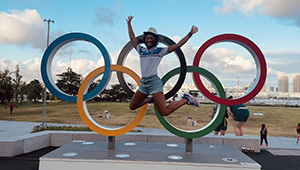What Rowing in the Olympics Taught Me About Training in Cardiothoracic Surgery
It turns out that being a professional athlete parlays well into a career in medicine.

Photo Credit: Veronica Toro Arana
As the Paris 2024 Olympic Games unfold, the nostalgia kicks in as I watch many of my friends participate in the sports they love. It’s hard to believe it has been 3 years since I competed in the Tokyo 2020 Olympics as the first Puerto Rican woman rower to ever qualify for the Games. It’s also hard not to reflect on the 9 years of grueling, daily training that led to my accomplishment—all the obstacles overcome, the lessons learned, and the people who helped me along the way.
Transitioning from my life as a full-time, professional rower to being a cardiothoracic surgery resident has been the biggest pivot of my existence. The lifestyle of an elite athlete—focused on prioritizing recovery in between training sessions with adequate sleep, diet, hydration, and mindfulness—and the constant stream of demanding 12-plus-hour shifts of a physician in training couldn’t differ more.
However, the high-performance expectations of an Olympian and a cardiothoracic surgeon are similar. Struggling throughout my first year of residency, as so many trainees do, I learned to translate some of the key lessons I took from elite sports into my rigorous training in cardiac surgery.
- Find Mentors and Role Models
Identify the people who have accomplished things you dream of, and don’t be afraid to ask questions. Most are happy to share their experiences and success stories. Sometimes you just have to be exposed to what is possible.
In 2014, 2 years after I started rowing as a freshman in college, I reached out to Genevra “Gevvie” Stone, MD (University of Utah, Salt Lake City), on LinkedIn to meet for coffee because I had found out that she’d competed in the London Olympics while attending medical school. I wanted to know how she managed to do both. The hour she took to share her story with me at the Flour Bakery changed the course of my next 7 years. Stone went on to win a silver medal in rowing at the Rio 2016 Olympics; I started medical school in 2016, and at the end of my preclinical years, went on to train full-time in rowing in preparation for the Tokyo 2020 Olympics, just like she had done leading up to London 2012.
When choosing a residency program, I sought out surgeons who embodied what I wanted to become. Crossing paths with Joanna Chikwe, MD (Smidt Heart Institute at Cedars-Sinai, Los Angeles, CA), the only female chief cardiac surgeon in any of the US integrated thoracic surgery residency programs at the time, was pivotal in my decision of where to train. Having her as my mentor has been crucial in navigating residency as a minority woman.
- Pick a Coach, or Several
Don’t practice skills on your own 100% of the time; you will pick up bad habits. New skills require guidance, and it is much easier to form new habits than to break old ones.
While sweeping (rowing with one oar in eight-person boats) with the MIT women’s crew team every morning, I started to practice sculling (rowing with two oars in a single-person boat, what I would end up doing at the Olympics) on my own every afternoon. While my fitness exponentially increased from the extra training, I developed a lot of bad habits in the single that I then had to work extremely hard to break when I eventually had the privilege of training full-time with several coaches, each of whom corrected different aspects of my technique. Having had this experience from sports, I sought out a surgical skills coach within the first quarter of my intern year. The time we spend together in the skills lab guides the practice I do on my own.
- Be Coachable
Expect to do it wrong, over and over again. The only way to get better is to be corrected constantly. Learn to listen and follow instructions with your body. Put your ego aside, and don’t take it personally. Keep the objective in mind.
I was once told by a coach that the moment they stopped yelling at me to fix something is when I should worry that they’ve given up on me. While yelling in the OR is generally frowned upon, I imagine the attending surgeons think similarly when they start taking cases away from residents instead of walking them through the difficult parts.
- Deliberate Practice Is Key

Repetition is very important, but do not engage in mindless repetition. Think about each movement. Learn to catch your own mistakes, and use your inner voice to correct yourself the same way your coach would. Recording yourself can be very instrumental in identifying your own mistakes.
My Olympic coach and I spent hours each week going over videos of me rowing and comparing them to how other rowers did things. Now, I share videos of my independent practice with my surgical coach. Whether I am practicing my surgical skills or rowing on my days off, I always have the voice of a coach in my head telling me what I can be doing better.
- Take Ownership of Your Own Progress
Be proactive. Ask for feedback constantly. You should be the person most invested in your progress.
During my time as a rower for MIT, I used to walk into the coaches’ office every day to ask for feedback. I was so persistent on getting critiqued that a comment about it went into the letter of recommendation my coach wrote for my medical school application. Being proactive is a huge part of how I became part of the first boat in the varsity crew on my second year as a rower. As a surgical resident, I make it a point to ask for feedback at the end of each of my operations.
- Keep Showing Up
Not all days will be good, but consistency is important. Many times, you learn more from the bad days than the good ones.
A rower I admire once told me that, when it comes to training, some days you just show up, some days you do the right volume, and sometimes you do the right volume at the right intensity—the most important thing is that you show up. During my intern year of residency, any time I was on an operative rotation, I made it a point to go to the OR at least once every day no matter how much work needed to be done on the floor. On busier days, I just needed to become more efficient to make it, but each day in the operating room I learned something new, even if I was just watching.
- Simulate “Race Day”
Make your practice conditions as similar to the actual event as possible. Create a vision for how a seamless case should go, and learn that feeling. However, expect things to not go perfectly and be ready to respond.
While it may seem easier to practice rowing down a 2-km course at full speed in a single boat than to set up a whole realistic cardiac surgery case, the ever-changing wind, water current, and weather conditions make race day similarly uncertain and variable. When visualizing a race, I was taught to not focus on the details of what would occur at every step down the course, nor on where each competitor was placed with regards to my position. Rather, what I needed to do was concentrate on how my body would need to feel and act for me to have a successful outcome. In addition to practicing skills in surgical simulation models, I take the time to visualize this “flow state” in surgery. This way, no matter what happens in the case, I remain calm, able to listen to and execute instructions from my attending, and together we are able to take the best course of action for the patient.
- Stay Humble
No matter how much you progress, there is always room for improvement. Never be overconfident. The moment you let your guard down is when mistakes start to happen.
In sports, they say: “Never underestimate your opponent.” In surgery, this can be translated as: “Never underestimate what can happen during a case.” I was once assisting in a laparoscopic cholecystectomy that took about 25 minutes. Once the case ended and the skin was closed, the patient became very bradycardic and coded. We reintubated and resuscitated the patient, who was eventually discharged from the hospital after spending a night in the ICU and a few extra days admitted to the hospital after what had seemed to be a simple gallbladder resection. The human body is a complex system, and we can never be sure of how it will respond to our interventions.
- Learn to Recognize Burnout in Yourself and Others
Check in with yourself regularly and make note of your energy level, efficiency, and mood. Spend time talking with those you love, take pause, and be kind to yourself. It is a long road to be great at any technical skill, with constant ups and downs, and when you get into burnout territory, your craft will stop being enjoyable and you will stop making progress.
In elite sports, it is often the coach who recognizes when an athlete is not performing on par with their abilities and then modifies the training to prevent burnout. In surgery, it may not be as easy to “cut the practice short” or to take a day off when we are tired, but we can pay attention to when our colleagues are struggling and offer our help, so that they may do the same when we are in a tough spot.
- Pursue Your Other Passions
Having something else you enjoy doing will help you push through when things get very hard at your main pursuit.
Looking back, it seems funny to think that during my full-time rowing career, I viewed my academic projects as outlets from my intense training schedule. Now as a resident, I try my best to find time to row and compete to the extent that I can. It is incredible how shifting priorities can make an activity that seemed so intense feel like a hobby!
Although I am not taking part in the Olympics this summer, I am looking forward to competing at the World Rowing Beach Sprints Finals in Genoa, Italy, in mid-September as a vacation from what now has become my top priority: operating on hearts.
Veronica Toro Arana, MD, is a cardiothoracic surgery fellow at the Smidt Heart Institute at Cedars-Sinai, Los Angeles, CA. She…
Read Full Bio




Comments